Since I often fly with Air France (I have a gold card with them), I felt compelled to have a look at the records. Indeed, I found evidence of the information Guy provided. However, being the picky son-of-a-bitch that I am, I was led to look into the matter a bit in more detail. In fact, my initial idea was that plane crashes are such a rare phenomenon that it is very hard to extract accurate estimates of crash probabilities. In addition, the matter is complicated by the availability of loads of information on the matter of plane accidents and related fatalities statistics on the web, most of which is incoherent, badly organized, and deceiving.
Indeed, my search on google for "airline accidents by company" returned at the top of the page a quick table which is already disturbingly un-informative:
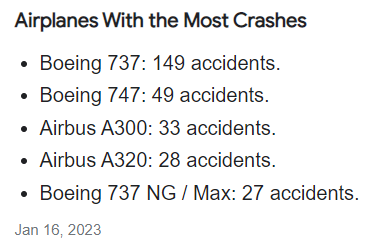
Why is that bad information? Of course, because it allows for no conclusion or inference, while it appears to inform on the different safety of airplanes of different make and model. There are heaps of Boeing 737 in circulation, so it is only natural that there have been many more accidents with that plane than with others. What would have been needed here, dear google, is to inform us on the denominator - the number of flights these planes took until the duly reported date of Jan 16 2023. Or maybe the number of flown miles, if one is more interested in the rate of accidents per mile. But let's leave this table alone and look at what else our searches may offer.
Concerning airplanes, one of the top hits is a Boeing document from 2022, which contains better groomed numbers. The graph below shows the rate of hull loss accidents per million departures - a much more well-defined number - for different airplane types. Here we confirm the previous note on the B737 not being such a disastrous airplane: the earlier 737-100/200 have rather high-ish rate of 0.91/million hull losses per million departures in accidents involving fatalities, but later models (300/400/500) drop to a rate of 0.26/M, and to 0.09/M in the 600/700/800/900 series, on par with the Airbus A320s and way below the rates of any of the B747. Of course, the matter is different if you consider the B737-Max, a sadly well-known flying coffin.
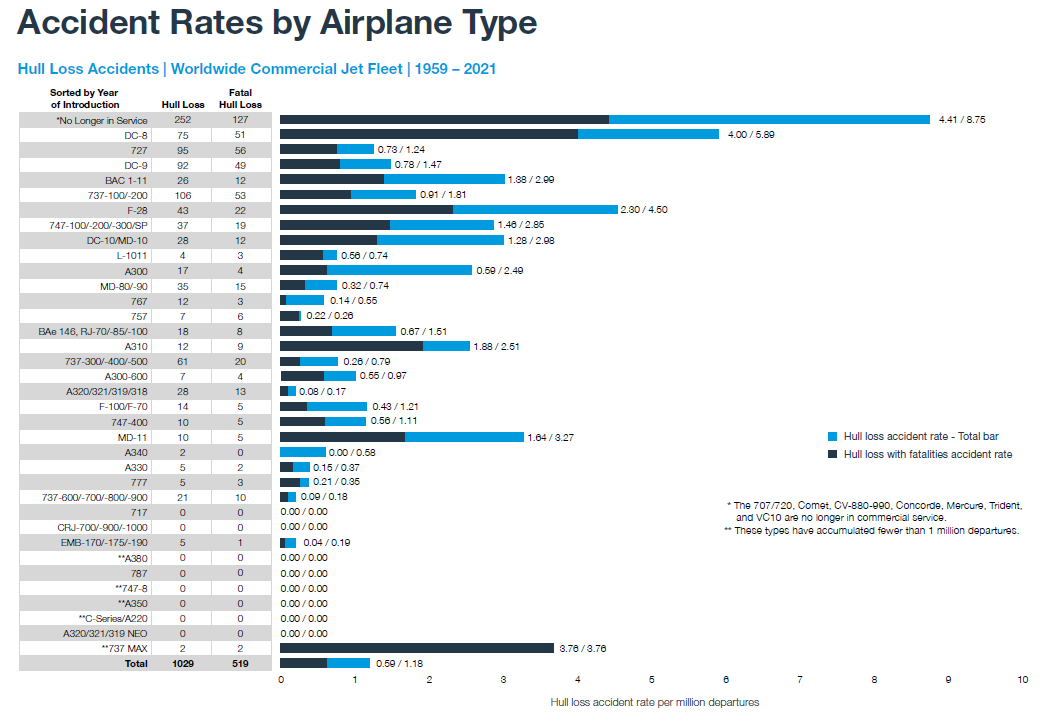
Of course the above graph glosses over an important confounder - these models were operative during quite different times in aviation history, and safety standards have consistently improved over the past few decades. So as interesting as the histogram above is, it agains does not make the cut IMHO.
A table from this site gets closer to informing us on airline reliability. It reports rates of accidents involving at least one fatality per airline. The reported statistic is the FLE: it is the number of deaths per million flights. Here is the list for European companies:
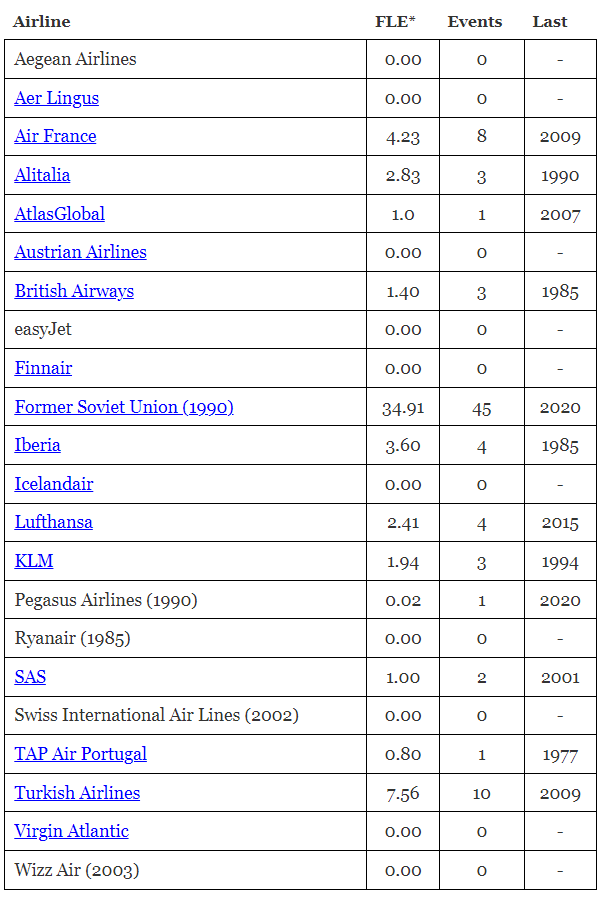
Here we indeed see that Air France is among the high-accident-rate companies: it ranks second below Turkish Airlines, if we exclude for compassion reasons the off-scale former soviet union, which has notoriously a rather frightening record of aviation disasters. But what I would like to draw your attention to is the inconclusive nature of all these numbers: in all cases except the single datum on the former soviet union, the number of crashes (third column) is too small to allow for any meaningful conclusion. Even Air France and Turkish, with 8 and 10 accidents respectively, cannot be claimed to be significantly different than companies in the average, like Lufthansa (2.91), British (1.40), or KLM (1.94).
If we look at the US we get a similar feeling, this time with American Airlines apparently on top:
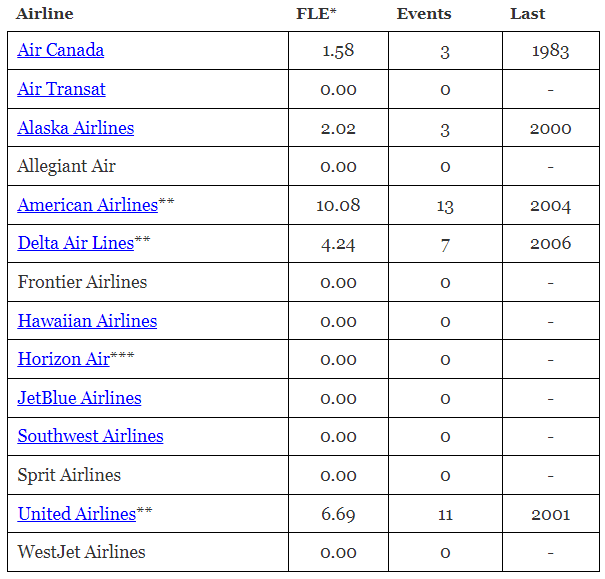
Is AA more accident-prone than Delta? It is not easy to say from the table. The number of accidents is almost twice as large for AA, and so is the number of deaths per million flights; but 13 is statistically not very different from 7, and the number of casualties is highly stochastic - just one accident with a big plane may blow it up a lot.
Another reason why the tables above are deceiving is that one cannot compare large to smaller companies when event rates are so small: not knowing the denominator in the FLE, we cannot tell how precise is an estimate of 0.0 - that 0.0 can be easily compatible with 3, or even to 10, by being a not-too-improbable negative fluctuation, for companies that fly much less than the big ones.
Perhaps it is best to rely on aggregated data provided here, to get a feeling that overall, flying is a very safe way to travel. The graph below provides information on the trend of crashes in the past forty years, and shows that rates have been decreasing by a factor of two over that period:
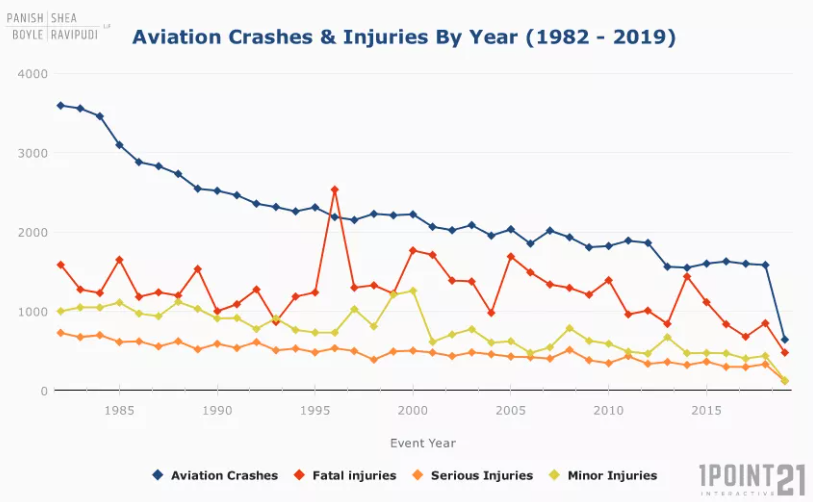
In conclusion, my take is the following:
- with the exception of at least one notorious offender, crash statistics provide insufficient evidence for the higher or lower safety of different airlines
- flying has become a lot safer in the XXI century
- if you fret over rates of 2 versus 4 deaths per million flights, you are missing the point: these numbers are really small. An average jet flies 100-200 passengers at a time, so we are talking about odds of not making it to destination of a few in hundred millions. You'd better worry about the odds of being struck by lightning (one in 15,300 during your lifetime, if you live in the US; and 10% of those who get the treatment die): in other words, your odds of dying by lightning strike are larger than those of dying in a plane crash, for all except high-intensity frequent flyers and airplane pilots. But please, don't. You're gonna be fine, I promise you'll die of some other cause! But don't ask me to bet on it - I would have a hard time collecting the cash.





Comments